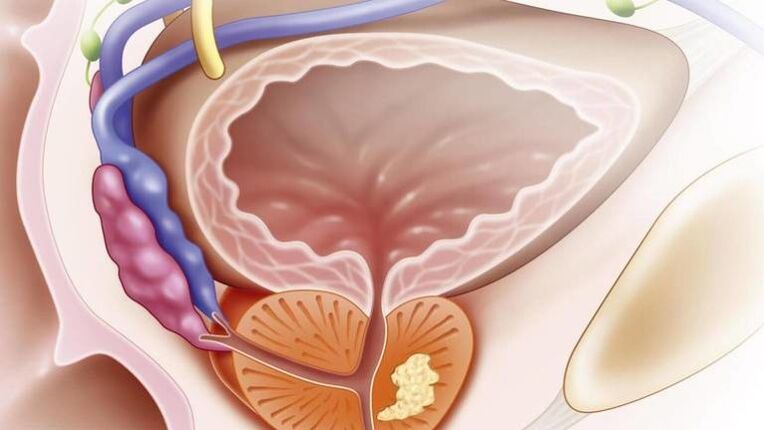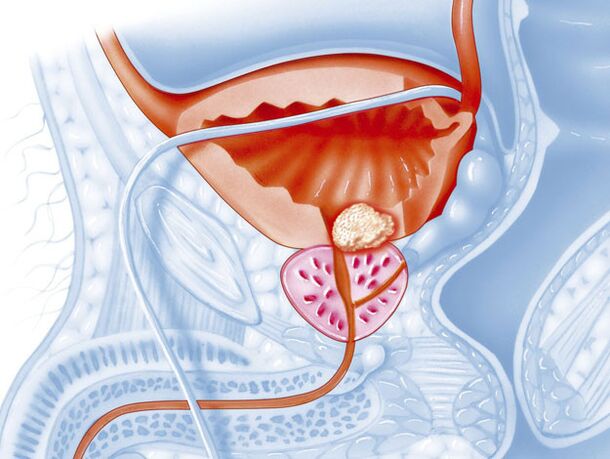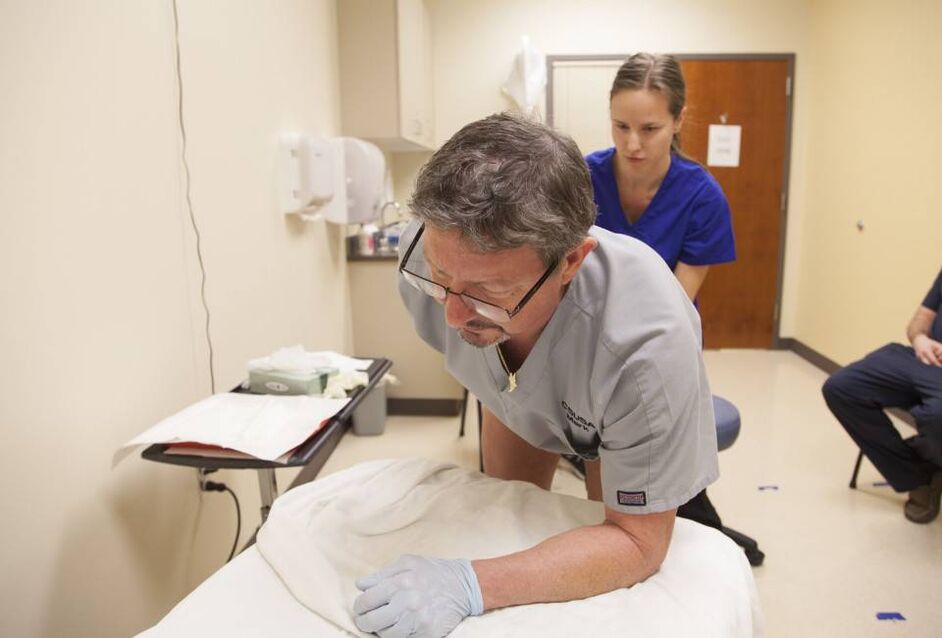Today, prostatitis occupies a leading position in genital and reproductive diseases among men over 45 years of age.Often, the disease is diagnosed at a more mature age, but the speed of modern life contributes to the fact that pathology is often found in youth.There are many reasons for the development of this disease, but it is necessary to treat chronic prostatitis in men in a timely manner.Doctors should choose medications based on the test results.Only complex therapies provided on time can stop the disease.
Chronic prostatitis
reason

Prostatitis is a disease that develops the inflammatory process in the prostate.The disease usually causes pathogenic microorganisms, from the urethra, bladder, intestines, or blood, and lymph falling into iron.Infection causes the development of inflammation.There are actually many reasons for prostatitis.The attractive factors are:
- Constant constipation;
- Hypothermia;
- A sedentary lifestyle;
- SPPP or urological pathology;
- Chronic diseases in the body;
- Sexual contact or opposite relationships are prohibited;
- Violation of the immune system;
- pressure.
type
There may be several types of chronic prostatitis:
- bacteria;
- potentially, accompanied by chronic pain in the pelvic area;
- Asymptomatic inflammation;
- Stagnant.
Before prescribing medication for chronic prostatitis in men, doctors must establish a pathology and find out the cause of its appearance.
Bacterial forms of disease
In this case, prostatitis develops due to bacterial infections developing in the glands.Therefore, the organs begin to get inflamed and pathogenic microorganisms actively reproduce in it.

Potential forms of prostatitis
It is characterized by long-term pelvic pain.The disease may be inflammatory rather than inflammatory.The symptoms do not exist, the pathology is hidden.
Asymptomatic prostatitis
The disease is severely diagnosed because it is asymptomatic for a long time.Pathology was observed in one-third of men with prostatitis.During examinations on different occasions, it is diagnosed by chance.The cause of the disease is not yet known.
Stagnant prostatitis
The cause of disease development is the process of gland stagnation.This is a non-communicable disease.There are many reasons for its development:
- Pelvic or spinal injury;
- abnormal structure of urogenital blood vessels;
- abnormal development of the intestine and bladder;
- abstinence or multiple sexual contacts;
- an inactive lifestyle;
- Metabolic disorders;
- Physical poisoning;
- Diseases of the musculoskeletal system.
diagnosis
To determine how to treat chronic prostatitis, doctors must examine men and find out the cause of the disease, form.First, doctors studied a teaching and conducted examinations to examine the body.He secretly studied the prostate.Laboratory examinations of trust, blood and urine are also prescribed.
When examining the secrets of the glands, the sensitivity of pathogenic microorganisms to various antimicrobial drugs was established.Without this, it is impossible to prescribe effective chronic prostatitis drugs.
treat
The chronic form of the disease has been undergoing a long period of remission and recurrence.However, according to the urologist, the disease can only be cured, but only if the disease does not function.However, even in severe cases, the patient's condition can be alleviated and the disease can be converted into a remission stage.

You also need to follow the doctor's advice to achieve all his appointments without doing so, you cannot cure the chronic disease.Treatment can be difficult and prolonged, but it can lead to positive results.
In urology, several groups of drugs are used to treat the disease.In this case, treatment should be complicated.The following drug groups will be highlighted:
- antibiotic;
- nonsteroid anti-inflammatory drugs (NSAIDS);
- hormone;
- alpha blockers;
- Reflux;
- Bioregulatory peptides;
- Muscle relaxant;
- Fito medicine.
Antibacterial drugs
Preparations for the treatment of chronic prostatitis must include antibiotics.This is necessary to inhibit the pathogenic bacteria.The doctor prescribes medicine based on the test results.
These drugs eliminate the cause of the disease.Today, several groups of antibacterial drugs are used in the urology department.
Penicillium Group
These drugs are often used because they are characterized by high bioavailability, widespread effects, resistance to the acidic environment of the stomach, and the minimum toxicity of all existing antibiotics.Proper use of this drug will eliminate the risk of adverse reactions.
All drugs in this group can be used in combination with other drugs.Penicillin is attenuated by co-administration with other antibiotics.
Cephalosporin
This medication for chronic prostatitis in men can be used in the third and fourth generations.Compared with the drug in the penicillin group, the difference between this drug is multiple effects and high resistance to β-lactamase.
Aminoglycoside
Usually these are natural antibiotics that have antibacterial effects on active bacteria.The greater the concentration of active substances in the blood, the stronger the effect of the drug.The drugs in this group were characterized by lack of allergic reactions, low toxicity levels, but high renal toxicity.Therefore, the doctor must correctly calculate the dose of the product before making an appointment.
Fluoroquinolonone
The formulations included in this group are different from all other antibiotics and their structure and origin.They do not have natural analogs and when the remaining drugs are ineffective, they are used in severe cases of disease.These drugs are represented by four generations.
Macrolides
This drug used for chronic prostatitis is the most toxic.This set of antibiotics is the safest.All patients are tolerant of these drugs and usually do not have adverse reactions.They accumulate in high concentrations of tissues, so they can be effective in treating any form and severity of prostatitis.
Anti-inflammatory drugs (NSAIDS)
The group's medications are designed to stop pain and reduce inflammation in the glands.
Hormonal drugs
These drugs are usually rarely prescribed, usually only if NSAID does not bring the necessary effects.
Alpha blockers
This medication helps relax the muscle tissue in the urinary catheter, thereby improving urine outflow.These drugs do not treat the disease, but eliminate their symptoms, especially delayed urination in acute or chronic forms.
Spasticides
These drugs eliminate vasospasm, help improve blood flow, eliminate pain, and improve the outflow of prostate secretion.Such funds are usually used for two to five days.
Muscle relaxants and bioregulatory peptides
With the help of such drugs, medical treatment for chronic prostatitis in men allows you to relax muscles in the genital area, eliminate pain, normalize the function of urine excretion, normalize the metabolic process in iron, and accelerate the regeneration of prostate tissue.
Plant therapy
This medication for chronic prostatitis is presented in capsules or solutions.
Other ways to treat prostatitis
In addition to drug therapy, you must also massage the prostate, take immunomodulators and exercise physically.Doctors can prescribe physical therapy courses to normalize the function of the glands.You also need to make the right food.Your doctor will tell you what you should follow.Only a comprehensive approach can help get rid of chronic prostatitis.This disease has been a long time, but it can be freed from it forever by all the effects of dates.In severe cases, it can be relieved for a long time.
remember!Prostatitis is the basic treatment
Any doctor will provide you with a variety of ways to treat prostatitis, from trivial and ineffective to radical:
- You can receive regular treatments for tablet and rectal massage, returning every six months;
- You can trust folk remedies and believe in miracles.
- Go and forget your sex life...






















